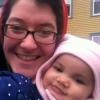Work
“Work” is a value-laden term that has changed drastically over time, particularly in relation to women’s daily lives. Despite a legacy of opinions to the contrary, WWHP views women’s work as inherently valuable, whether taking place in the formal structure of paid employment or the private realm of home and family. We seek to understand each woman’s work on her own terms in her own words.







